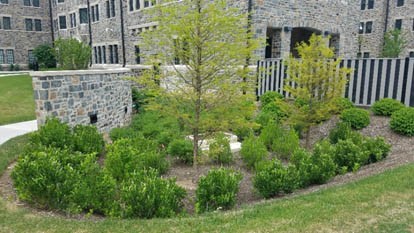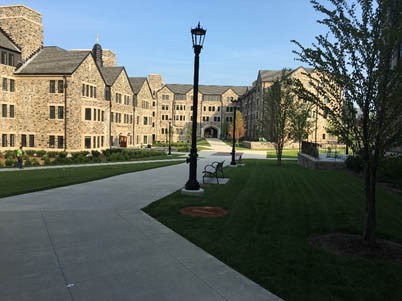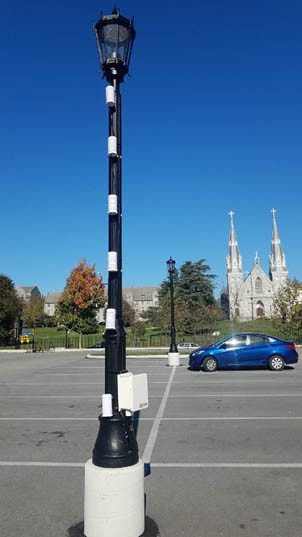The Commons: Student Housing Development with Stormwater Infrastructure
Villanova University redeveloped an ultra-urban area (an aged 9 ac 100% impervious parking lot with no stormwater management) into a undergraduate residential site with decreased impervious area and 13 GSI systems (ten rain gardens, two cisterns that supply the HVAC system, and one detention basin).

Villanova’s Main lot (left) vs. the completed Commons (right).
The research site is in the Darby Creek watershed, a tributary to the Delaware River, which is an impaired stream although not listed as a 319 NPS priority watershed. The project is supported by the US EPA section 319 Nonpoint Source National Monitoring Program.
Design
The system’s design greatly exceeds township requirements to capture, treat, and remove 5.8 cm (2.3 in) of rainfall. The post-construction site reduces impermeable surfaces by 40%. Ultimately, the Commons is aiming to be a successful study area that proves highly impacted sites can be reconstructed to successfully manage stormwater by reducing peak flows and shortening time of concentration.
Rain gardens are depressed planters with high infiltration capacity to eliminate runoff during and after a storm event. Ten rain gardens are spread throughout the site, capturing and infiltrating runoff from permeable and impervious surfaces, including roof runoff.
Monitoring Interests and System Capabilities
A primary monitoring parameter is runoff flow rate, as the flow dictates and informs the water quality of the site and is the metric with which the completed redevelopment site was designed. Flow meters are set up at the site’s outlet structure to monitor depth, velocity, and flow. Water quality sampling has also been ongoing since before construction started, giving a complete picture of how the site has changed before, during, and after construction.

One of the ten rain gardens on site that receives runoff.
In addition to the rain gardens that receive runoff from the ground, the two cisterns and detention basin receive runoff from the roofs, impermeable surfaces on site, as well as 6 acres from Lancaster Avenue. This is one of the first stormwater harvesting systems monitored for non-potable water availability despite its applicability to water infrastructure in growing urban areas. Detention basins are used for large-scale collection to help slow down runoff being channeled to the outlet, and ultimately the existing city sewer system. The underground cisterns store the roof runoff before the it is pumped up to cooling towers in Friar Hall, where it is filtered, sanitized, cooled, then distributed among the HVAC network in the resident halls. The next phase of this project aims to investigate and quantitively answer “how can stormwater reliably be harvested and reused and how can harvesting and reuse be enhanced by real-time controls?”

The main courtyard that has three rain gardens and also houses the underground detention basin and the largest of the two cisterns.
Temperature is also monitored to inform on the urban heat island effect and the effect GSI plays a role on a redeveloped site. As urbanization continues to increase, cities are getting hotter which effects public health, precipitation patterns, and energy consumption. By monitoring temperature at a few different places on site we hope to answer how green infrastructure can help reduce urban heat.


VCRWS NEWS
Chenfeng Xiong, PhD, Virginia Smith, PhD, and Peleg Kremer, PhD, with support from Bridget Wadzuk, PhD, have been awarded $750,000 of a $2 million research grant by the National Science Foundation (NSF) for a project designed to reduce the vulnerability of underserved communities to the social and environmental impacts of urban flooding events.
Dr. Bridget Wadzuk Receives 2024 Outstanding Faculty Research Award
The professor of Civil Engineering and director of Sustainable Engineering was recognized for her work in water resources engineering and green stormwater infrastructure, most notably her research on the evapotranspiration process from green roofs and bioretention.
Villanova researchers say rain gardens can be an effective tool for managing stormwater
The school's rain gardens have proven effective at helping prevent raw sewage from overflowing into waterways.
Courtesy of whyy.org



